N-of-Dad: Treating my father’s dementia with Methylene Blue
It's not a perfect methodology, but the old “N-of-1” trial is still good for some things. When your dad's brain is at stake and a haphazard "N-of-1" is the only shot you have, you take that shot.
You’ll usually hear the term “N-of-1 trial” used as a criticism — an almost pejorative way for scientists to warn of the pitfalls of small experiments. “N” refers to the number of participants in a study. In this case (you guessed it) it’s a trial with only one participant.
“Drinking emu milk made all of Sheryl's hair grow back.” That’s an N-of-1. It’s great information for Sheryl, but what if Sheryl is an outlier? We can’t expect a study with a large number of participants to have the same results.
En-Vogue-of-1
Thanks to the Biohacker movement, the N-of-1 model has had a bit of a resurgence in recent years, and many doctors who practice personalized or precision medicine have made statements in its defense. After all, when you’re treating a patient the thing that matters most is how the treatment works on that patient. Assuming that patient sits dead center on the bell curve is the move of a clinician who doesn’t have the time or intuition to treat the person in front of them.
In the spirit of the N-of-1 comeback, I’m going to share my most successful N-of-1 to date: I started my dad on an old-school drug called Methylene Blue in hopes of diminishing his dementia and early Parkinson’s symptoms. Spoiler alert: It went so well that even his dog is now taking the stuff.
The scientist in me can’t call this an “experiment” in good conscious, as almost none of the variables were under my control. It moved more like a narrative than it did a study, so I’m going to do what I actually do best and call in the writer in me. She’s going to tell it to you as it should be told: like a story. I hope it can both tickle your brain and touch your heart…
Setting the scene: Meet Dad
To understand the stakes in this story you first need to understand its hero: My dad, Dr. Lombardo Palma.
Papi is a true wild card. A retired Family Practice doctor from Nicaragua, he never fit in anywhere. Certainly not in Salt Lake City, Utah, where he practiced for his entire career, where I was born, and where he still lives with his elderly chihuahua, Mannie.
When I went to Nicaragua with my dad for the first time in my early twenties I was surprised to realize that he was no more at home there than he is in Utah. At 6’4” he’s a solid head taller than any of his countrymen, and the image of him with his ostensible kin is a good analogy for how his ideas were always received in medicine: They’re too big, too fringe, and like a lukewarm gazpacho in a Tex-Mex restaurant, served at a charmingly confusing temperature.
Despite being loved by his patients and having a rare therapeutic touch, Dad never hit it big. When he was practicing he served a low-income, Spanish-speaking community and to say that he doesn’t have a knack for business is an understatement.
His practice was rarely in the black, but living in debt and on a shoestring never seemed to bother him. The life he lived in his thoughts was grand: he was preoccupied by theoretical biochemistry and neuropharmacology – always on the verge of a breakthrough in how doctors treat complex neurological injuries, if only the world would listen.
For most of his career he exercised his little scientific obsessions with self-experimentation (and by telling anyone who would listen). He submitted the odd Opinion Piece to medical journals, who, after several months of back and forth, would always find a polite way to tell him that Neurology Journals don’t publish small-time Family Practitioners who don’t hold positions in Academic Medicine. But Dad is blessed with the oblivious optimism of a man who will unironically wear a fanny pack for any and all occasions, so that never stopped him.
How it started, how it’s going…
When I was a kid most of what we talked about was science. He would spend hours making sure I understood every granule of mechanistic detail, grooming me to someday take over his life’s work. Imagine his surprise when I became an actress. Then a writer. Then a doctor!... but then a doctor of a type of medicine that he neither understood nor had much reverence for. He’ll still ask me to edit his next journal submission from time-to-time, though. Last time that happened was on my birthday, which he had forgotten.
It’s not that he’s a bad father. For the last decade I’ve been watching my dad lose footing, inch-by-inch, in a heart-wrenching tug-of-war with dementia.
The most frustrating part has been becoming an incredibly effective disease-reversal specialist myself: I know what to do to make him better. But what to tell the man who knows everything? For reasons of either ego or lack of belief in my approach, I haven’t been able to even get to step one with him.
That is until recently.
Enter Methylene Blue
A very old drug called Methylene Blue made a comeback in frontier medicine recently, thanks to its efficacy in treating the brain fog and fatigue we’re seeing with Long Covid. Owing to its ability to resuscitate injured mitochondria (the cell’s battery), Methylene Blue is also a game changer for dementia treatment.
I had a feeling this might be one intervention I could get Papi to try. After all – it’s a drug. The guy loves drugs. It wouldn’t require him to make any changes or do any work, like most of the interventions I prescribe do.
I knew that if I was going to get him to try it, I’d have to make him think that it was his idea. I sent him a video on the cellular mechanism of Methylene Blue and its synergy with red light therapy, I dropped a few scientific papers in our text chain at unobtrusive intervals, and I waited until he asked me to write the prescription.
Less than two weeks after starting him on Methylene Blue capsules, I got a text from my dad:
His Parkinsonian hand tremor had almost completely disappeared. In the coming weeks he would tell me that his memory was back, he was having vivid dreams, and his back pain and gout were remitting. He’d send me videos jumping up and down on his formerly gouty feet and would answer my Facetime calls wearing a flashing red-light-therapy cap (looking like some kind of K-pop elder-raver).
The happiest dog in SLC
Dad liked the effect so much that he started giving Methylene Blue to his 16-year-old chihuahua, Mannie (along with red light therapy to potentiate the effect). The benefit for the dog’s the energy and functionality was immediately noticeable, and Dad did a great job of documenting the whole veterinary journey for me.
Papi goes to Hollywood
I did such a good job convincing my dad that the Methylene Blue was his idea, that he still thinks he invented it… and I’m totally cool with that. The win here is bigger than him trying something I suggested for the first time, or even than the effect of the Methylene Blue. Dad has agreed to do an intensive, 3 - 4 week one-on-one with me, during which I stay with him in Utah and use all of the tools in my Sub-Diagnostic Analysis toolkit to reverse his dementia. He has also agreed to allow a small camera crew to record the whole process (with the sole condition that Mannie can be part of it, too).
I’ll take some of this time to learn from him as well. After all, even though he’s retired he’s still an incredible doctor. Doctors of his generation from developing countries learned to use the five senses in a way that my generation never will.
“If you think you’re enlightened, go spend a week with your parents.”
– Ram Dass
Our progression through the workup and treatment will roughly look like this:
Sub-Diagnostic Analysis workup and testing (especially for hidden infectious issues and environmental toxins and toxicants)
Nutritional strategies for dementia
Environmental optimization
Movement for brain health and chronic pain
Sleep, light hygiene and circadian optimization
Supplements and medicines for brain health maintenance
Supplements and medicine protocols for root-cause reversal
Meditation, belief, self-compassion and stress-reduction
Some stuff will definitely come up for me, and there’s slim but non-zero chance that I go full-on crazy, but I think I’m ready to share how I tend to the open wounds of the filial bond with the world. Hopefully by the end of it we’ll all be living as large as Mannie the Chihuahua, shown here wrapped in a red light blanket:


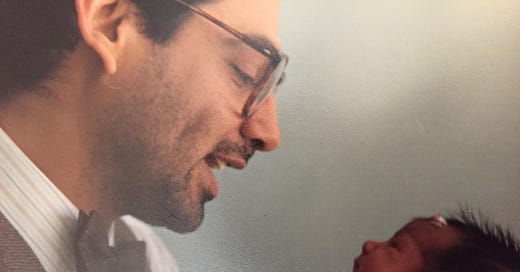


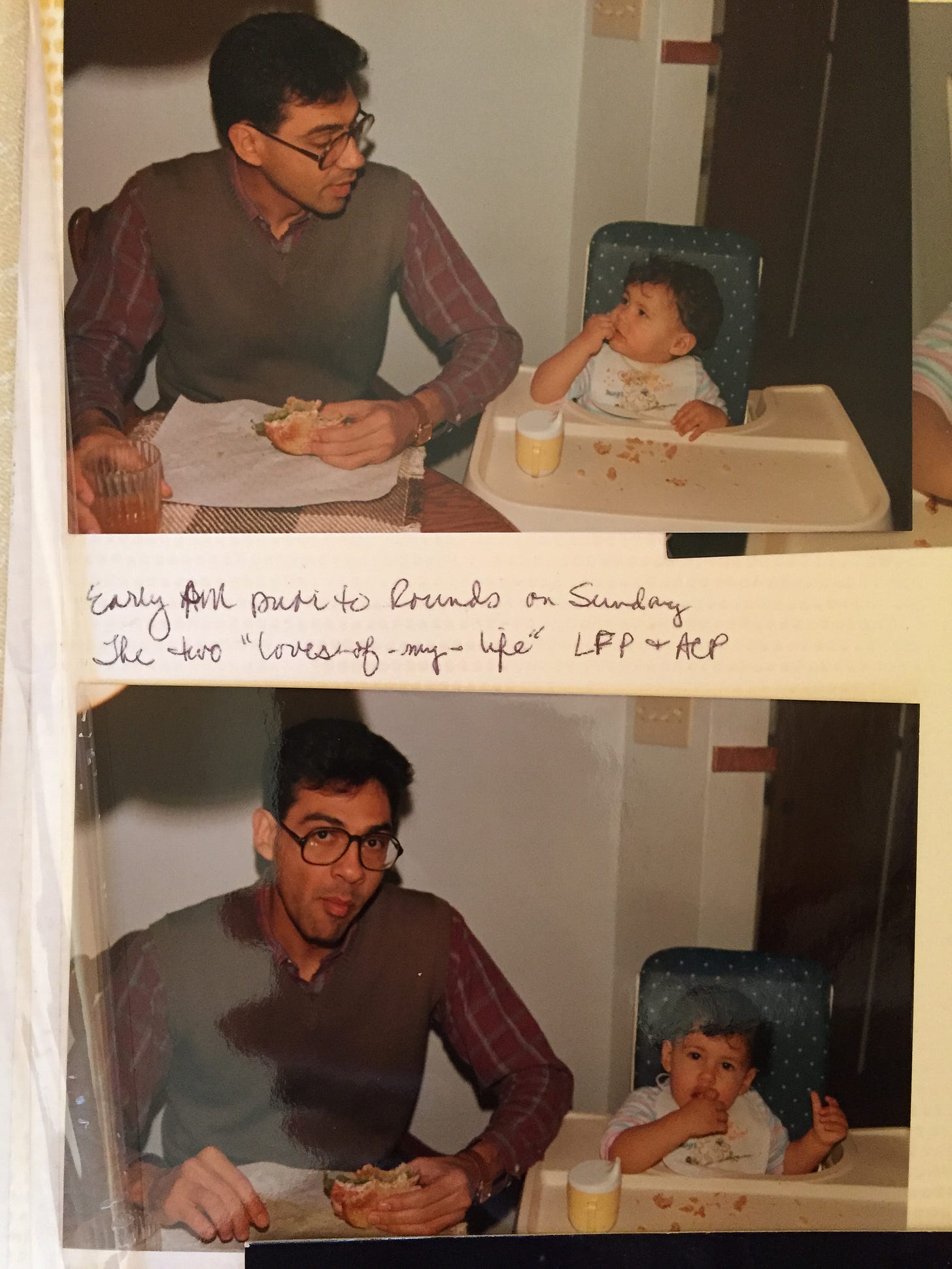
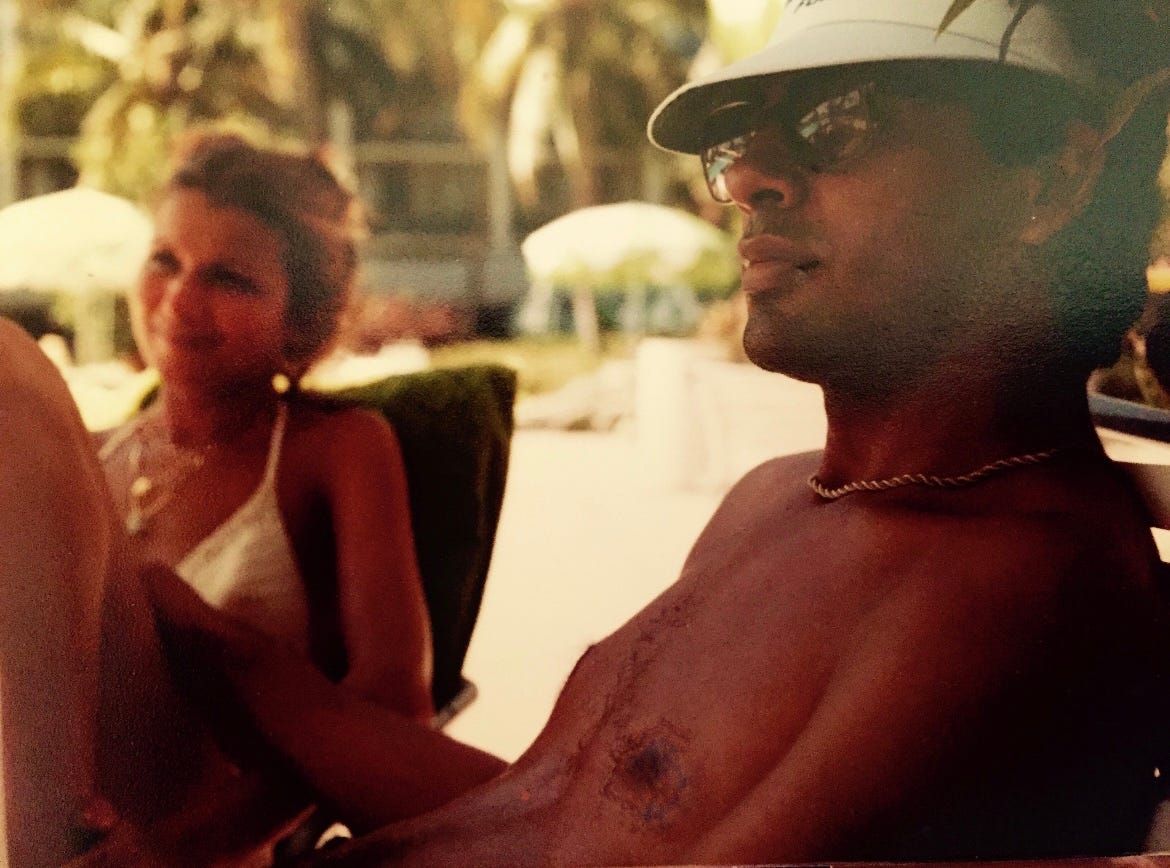

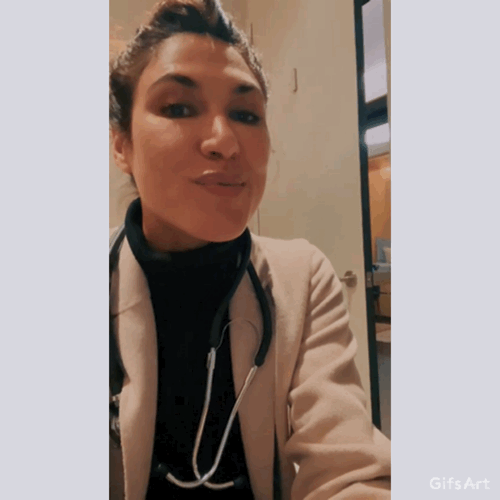

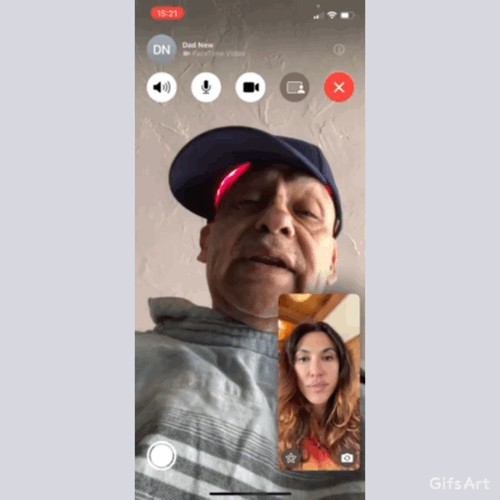

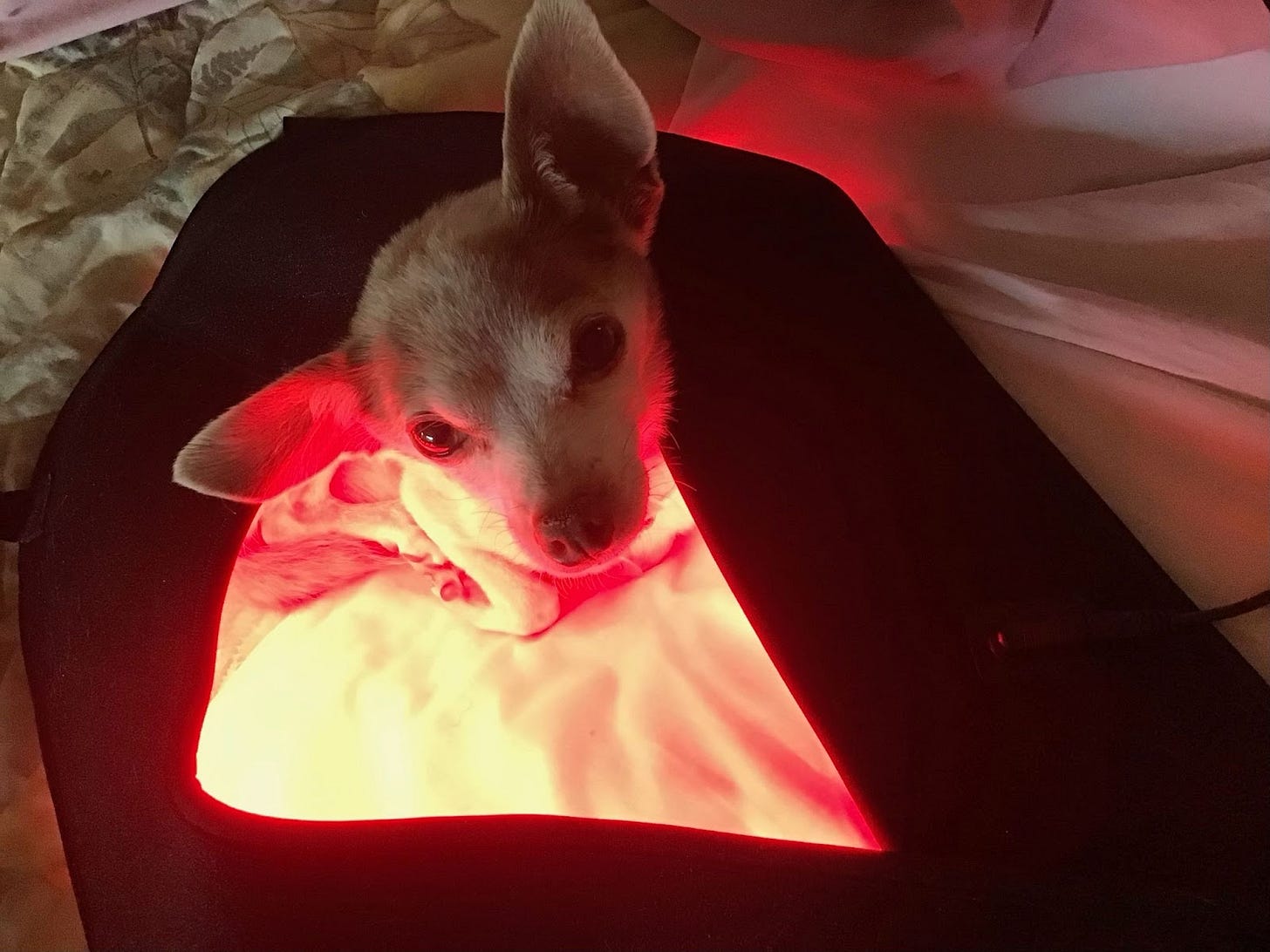
"But Dad is blessed with the oblivious optimism of a man who will unironically wear a fanny pack for any and all occasions, so that never stopped him." This! Love the fact you got him to think it was his idea - the things us women will resort to to get the ball rolling . Best of luck with your father. Wishing you a lot of patience and laughter and long walks with Mannie. My father passed almost 2 years ago. Cherish every moment.